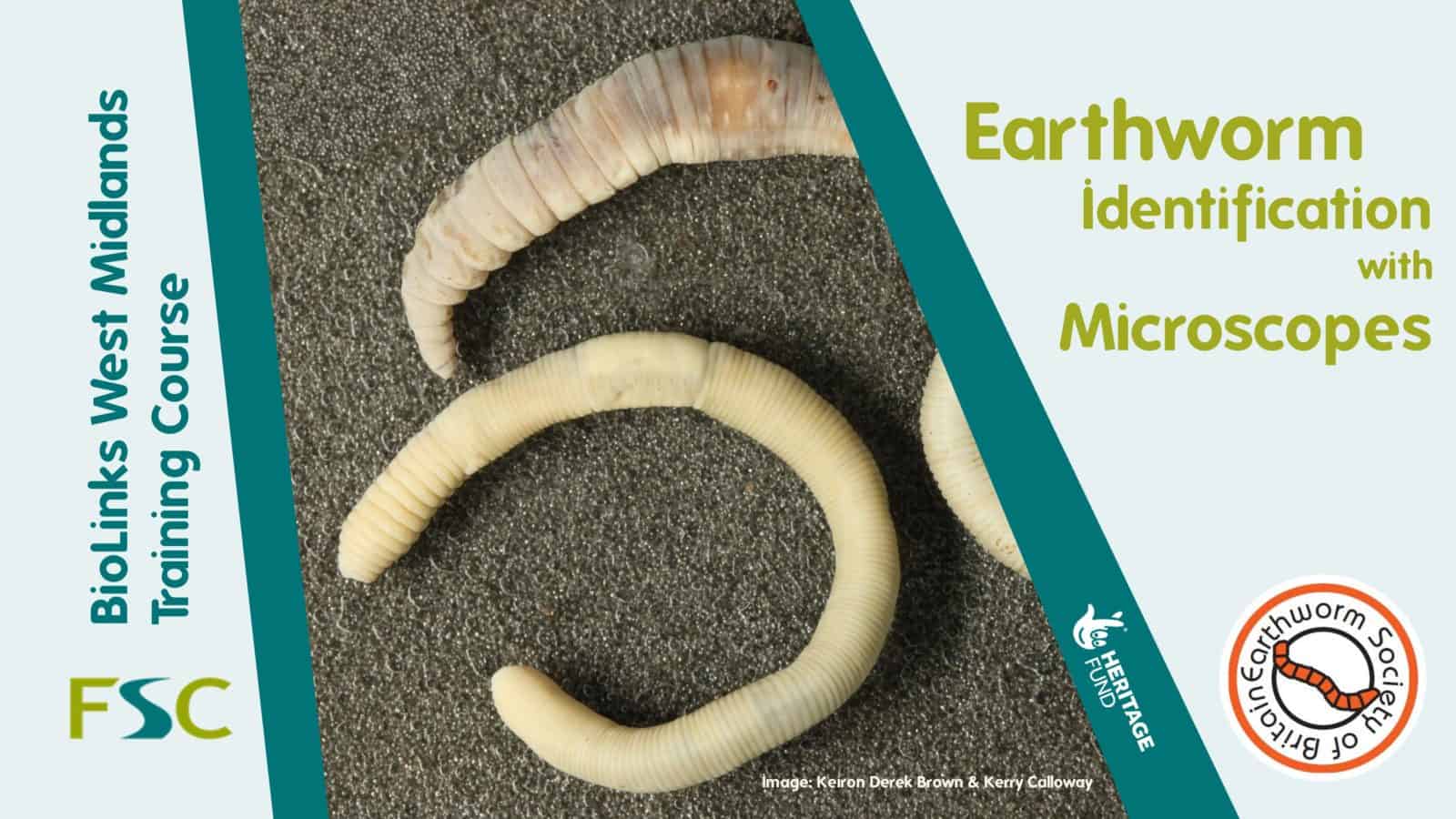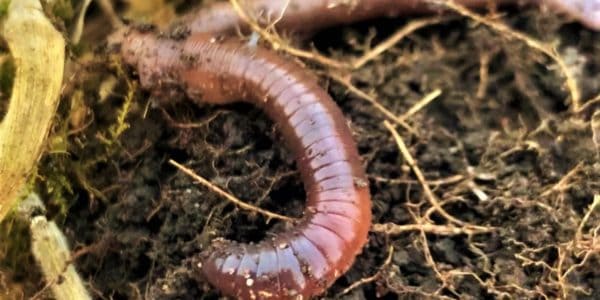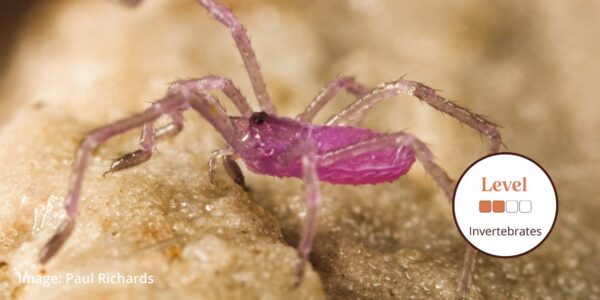There are 29 species of earthworm living freely in soils in the UK. They are vital to the economic health of our country, as they are crucial for soil health, food production, waste decomposition and even flood mitigation.
Despite their importance, relatively few people are skilled in identifying earthworms to species level. Identification of earthworms involves inspecting specimens under a microscope to observe key morphological features that are often too small to see with the naked eye. However, with only 5 features used to distinguish between the 29 species, earthworms are a great group for novices. Learn the difference between a tanylobic and epilobic head type, how to record the position of the clitellum and how to determine if the setae on an earthworm are closely or widely paired.
This course provides an introduction to identifying earthworms using the FSC AIDGAP Key to the Earthworms of the UK & Ireland. This includes a short presentation introducing the morphological features used to identify specimens to species level and support from an Earthworm Society of Britain tutor throughout the practical sessions.
-
- Certificate upon course completion.
- Endorsed by the Earthworm Society of Britain.
- Please email [email protected] if you have any questions.
- Please note that this course will involve using specimens that have been killed and preserved.
This course is aimed at adults only and course attendees must be at least 18 years old in order to attend.
What will be covered during this course?
- The external (morphological) features used in earthworm identification.
- How to work through the Key to the Earthworms of the UK & Ireland to determine earthworm specimens accurately to species level.
- Practical experience observing earthworm ID features using a microscope and specimen collection.
- No microscope experience is necessary – our tutors will set up and show you how to use a microscope.
See the ‘Example Timetable’, ‘What’s Included’ and ‘Before You Attend’ sections below for more information about this course.
Course Fees
Regular Price: £75 For professionals and residents outside of England. Select ‘Attendee: In Person’. Sold Out
Subsidised Price: £10 Subsidised by the FSC BioLinks project for non-professionals eg. volunteers, biological recorders, wildlife gardeners, amateur naturalists and students.Available to UK residents only. Select ‘Attendee Subsidised: In Person’
Tutor: Keiron Derek Brown
Keiron Derek Brown is passionate about biological recording and studying invertebrates, and delivers a wide range of events and training opportunities through the Biological Recording Company. He is the national recorder for earthworms (running the National Earthworm Recording Scheme on behalf of the Earthworm Society of Britain) and the Chair of the Ecology & Entomology section of the London Natural History Society. He also sits on the advisory council of the National Forum for Biological Recording.
Between 2016 and 2023 he designed and managed the £1.6 million FSC BioLinks project for the Field Studies Council, with the aim of inspiring amateur naturalists to take up the identification and recording of invertebrate groups that are often forgotten and rarely recorded.
Covid Measures
In order to keep our customers and staff safe we ask that anyone attending our centres:
- wears a face covering when in shared indoor space (unless exempt).
- maintains social distancing.
- cleans their hands regularly.
- takes a Covid-19 test before they arrive.
Example Timetable
- Please arrive in time for the course to start promptly at 10:00 am.
- Refreshments will be available from 9.45 am.
- The course will end at 4:00 pm.
What's Included
- 6 hours of tuition
- Certificate of attendance
- Access to a microscope, identification resources and specimens
Bursaries and Subsidies
FSC BioLinks
FSC BioLinks is an exciting project for FSC in the South East and West Midlands, bringing together existing volunteers with skills in biological recording and identification, and new volunteers.
This project provides subsidised training courses, learning opportunities and digital tools focussed on invertebrate identification for anyone involved or interested in biological recording, to build and strengthen the community.
Invertebrates provide us with many useful ecosystem services, like pollination and decomposition, which we cannot survive without but their numbers are declining. Few people know how to identify or record invertebrates meaning there is a lack of data
We are delighted to have been awarded a grant of £1.23 million from the National Lottery Heritage Fund for this project.
Before You Attend
Getting to FSC Bishops Wood
FSC Bishops Wood, Crossway Green, Stourport-on-Severn DY13 9SE
- By car from Kidderminster: (M5, A38, A449 southbound) On the M5 heading southbound coming off at junction 5, taking the third exit on the roundabout to get onto the A38. at the first roundabout take the third exit onto Kidderminster Road going straight over the next roundabout sticking to Kidderminster Road. At the second left turn to follow Doverdale Lane. Once you have come to a sign turning right onto the A449 take it until you get to the Mitre Oak pub on your left. Take the first exit on the roundabout onto Bishops Wood Lane, finally taking the first left on you will arrive at Bishops Wood Field Centre.
- By car from Worcester: (M5, A449 northbound) On the M5 heading northbound, take Junction 6 to Worcester/ Kidderminster taking the second exit heading for the A449 northbound, continuing for 9 miles. At the roundabout with the Mitre Oak pub take the first exit onto Stourport Road. Take the first left onto Bishops Wood Lane, finally taking the first left on you will arrive at Bishops Wood Field Centre.
- By train: The nearest station to the centre is Hartlebury. From here, it is a two-mile walk to FSC Bishops Wood, or a short taxi ride.
What to bring
- Notebook and pencil
- Lunch
- If you have your own copy of the 'Key to the earthworms of the UK & Ireland' bring it with you so that you can make notes in your own copy.
- Any earthworm specimens that you'd like verified (tutor availability during the course permitting)
Please note that this course will involve using specimens that have been killed and preserved.
There will be a member of staff with first aid training and access to a first aid kit on site. If you have special medical requirements please let us know as soon as possible so we can plan the course.
Sorry this course has ended



